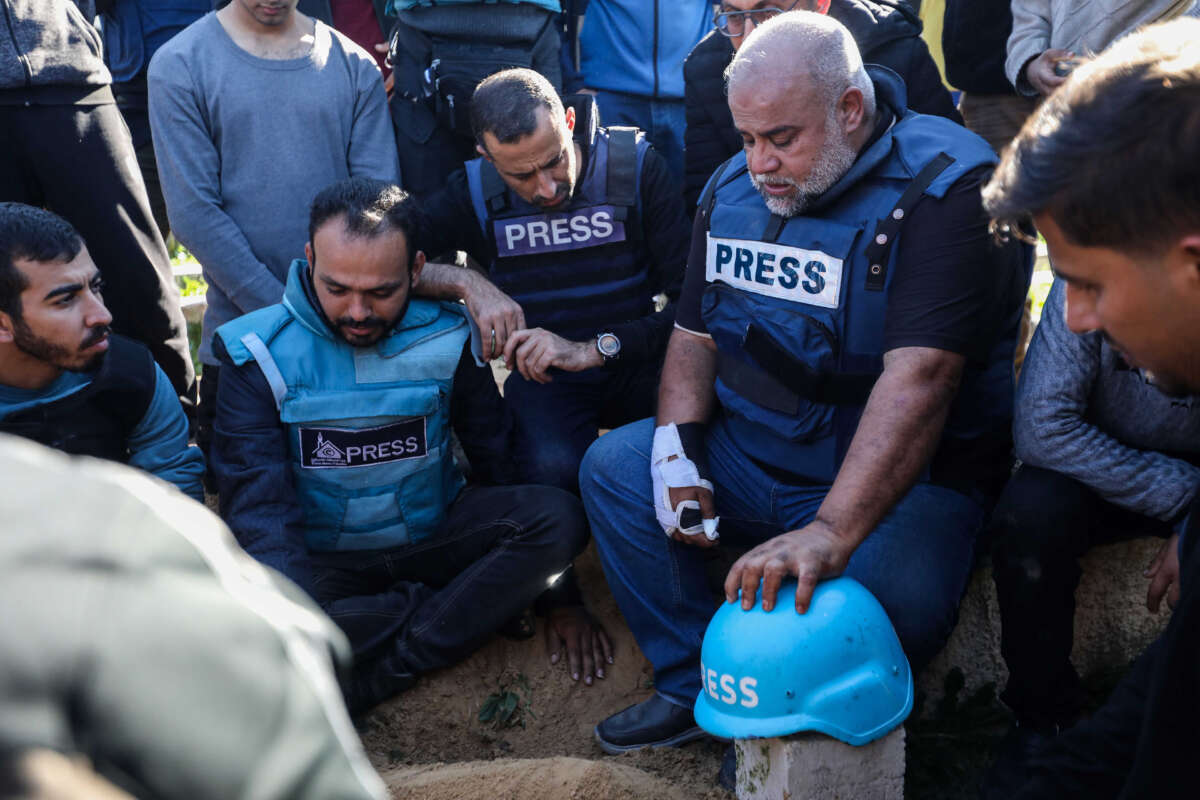Did you know that Truthout is a nonprofit and independently funded by readers like you? If you value what we do, please support our work with a donation.
The Committee to Protect Journalists (CJP) has called for an impartial investigation into the Israeli drone strike on Sunday that killed freelance journalist Mustafa Thuraya and Al Jazeera reporter Hamza Al Dahdouh, son of Wael Al Dahdouh, the Gaza bureau chief for Al Jazeera.
Hamza Al Dahdouh is the fifth member of Wael Al Dahdouh’s family to be killed by an Israeli airstrike; on October 25, an airstrike targeting the Nuseirat refugee camp killed Wael Al Dahdouh’s wife, daughter, son, and grandson.
“The killings of journalists Hamza Al Dahdouh and Mustafa Thuraya must be independently investigated, and those behind their deaths must be held accountable. The continuous killings of journalists and their family members by Israeli army fire must end: journalists are civilians, not targets,” Sherif Mansour, CPJ’s Middle East and North Africa Program Coordinator, said in a statement on Sunday.
Since October 7, Israeli forces have killed at least 79 journalists and media workers in Gaza and the West Bank. The International Federation of Journalists (IFJ) found that Israel’s genocidal bombing campaign in Gaza has killed more than one journalist a day since it began, accounting for 72 percent of all journalist deaths worldwide in 2023.
“Since 7 October, more than one journalist a day has lost their lives during the war in Gaza, a scale and pace of loss of media professionals’ lives without precedent,” the group said in a press release. “In 2023 Palestinian journalists in the Gaza Strip have been the victims of indiscriminate bombing by the Israeli army. The IFJ calls on international authorities to ensure that international law is respected and to put an end to the massacre of journalists in Gaza.”
In December, a CJP report revealed that the number of journalists killed in the initial ten weeks of Israel’s assault on Gaza surpassed the total number of journalists killed in any single country throughout an entire year.
“The Israel-Gaza war is the most dangerous situation for journalists we have ever seen, and these figures show that clearly,” Mansour said in a statement. “The Israeli army has killed more journalists in 10 weeks than any other army or entity has in any single year. And with every journalist killed, the war becomes harder to document and to understand.”
CJP also found that in addition to Israel’s systematic killing of Palestinian journalists, which is a tactic that has been used by the Israeli military for over 20 years, Israel has begun targeting journalists’ families.
“CPJ is particularly concerned about an apparent pattern of targeting of journalists and their families by the Israeli military,” CJP said in a statement. “In at least one case, a journalist was killed while clearly wearing press insignia in a location where no fighting was taking place. In at least two other cases, journalists reported receiving threats from Israeli officials and IDF [Israeli Defense Forces] officers before their family members were killed.”
Recent investigations by Amnesty International, Human Rights Watch, Reuters and AFP into an Israeli strike in southern Lebanon on October 13 found that the IDF attack was most likely a deliberate assault targeting Reuters videographer Issam Abdallah and six other journalists.
“Israel says it does not target journalists. It needs to explain whether it used one of its drones for a precision attack on these two journalists and why it launched strikes on those like Reuters journalist Issam Abdallah, who was clearly wearing press insignia and away from direct fighting,” said Mansour.
Advocacy groups believe that the Israeli Defense Forces are attempting to suppress media coverage of the genocide in Gaza by killing journalists in violation of international law. In November, Reporters Without Borders filed a case with the International Criminal Court, asking it to investigate “war crimes committed against journalists during the Israeli-Palestinian conflict in Gaza.”
Press freedom is under attack
As Trump cracks down on political speech, independent media is increasingly necessary.
Truthout produces reporting you won’t see in the mainstream: journalism from the frontlines of global conflict, interviews with grassroots movement leaders, high-quality legal analysis and more.
Our work is possible thanks to reader support. Help Truthout catalyze change and social justice — make a tax-deductible monthly or one-time donation today.
